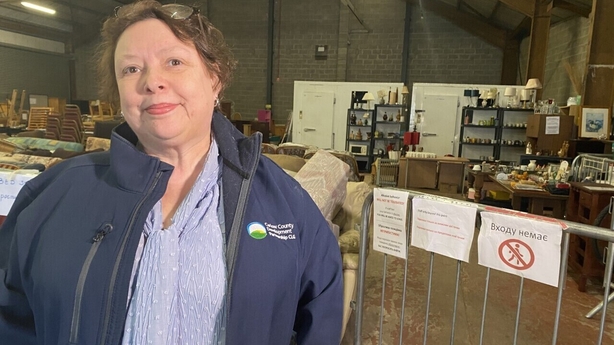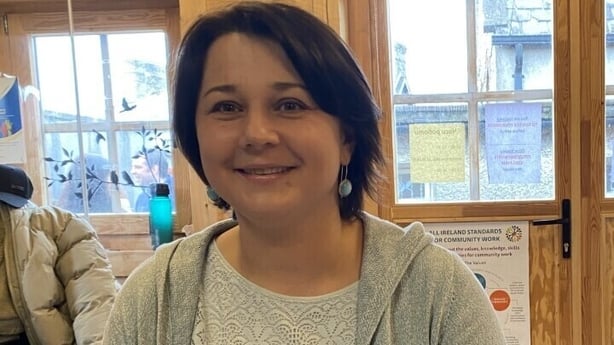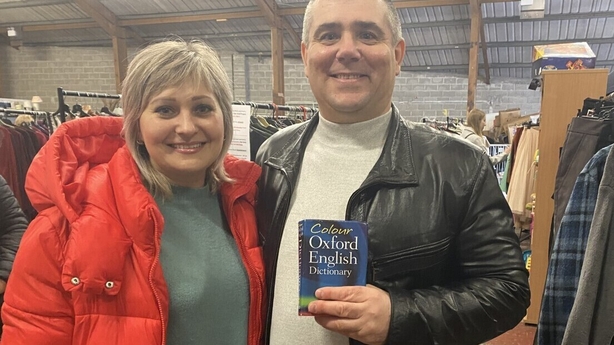
Just weeks after the Russian invasion which transformed her country into a war zone overnight, Olena Turkenych arrived in Co Carlow.
It was the last stop on a journey towards refuge that took her from Ukraine across Europe and into this country.
While settling in with her husband and children, still thinking of the relatives left behind, she quickly realised that the many who would follow across the continent would need help.
Ms Turkenych began volunteering, helping her compatriots with interpreting and English lessons in a variety of settings such as supermarkets, accommodation centres and community outlets,
Then the Carlow County Development Partnership stepped in.
"I did some translation for them as well, individuals and groups of Ukrainians, and they offered me, why not start working for them. It all started as a part-time job, then it went to a full-time job," she said.
"It's all about Ukrainians. A lot of paperwork, because people come to us and they need help and support with filling in different forms, in English, and we do this for them. We support them with applying for medical cards, PPS numbers, and we try to find free available places in creches and schools because we are in close connection with the Department of Education and the HSE.
"A lot of them - you would be surprised to know how many different queries can be there, that people come to us with different issues."
She added that has been "rewarding" to be able to help her compatriots.
"People are coming here, they are struggling, it’s a real huge challenge for them and they are struggling trying to settle down. Even a simple thing like going to the supermarket and buying some food, it’s a real challenge for them.
"I try to use any simple way to help my fellow-Ukrainians."
"Carlow is a nice town, with very friendly and helpful people"
The Ukraine Information Centre set up by Carlow County Development Partnership has been a mine of information and support for the 1,000-plus refugees who have arrived from that country in the last year.
Annette Fox, CEO of the development partnership, said they have been helping with the humanitarian response since last March, and it is something they are used to, although not to this extent.
They have adapted the Be Kind project, first developed in the early days of the pandemic, to become a hub in Co Carlow where local people can donate household items and clothes for collection by those who have arrived from Ukraine, or elsewhere.
"It’s hugely important that people from Ukraine become involved in different things in the community.
"Language is a huge difficulty and any form of integration or inclusion really depends on communication so [Olena] has been a huge help in that area. But also, people volunteering and people getting involved on a day-to-day basis, that’s the true integration, that’s the true measure.

"You have people from Poland, people from Ukraine, people from Syria, people from Ireland, from Carlow, from wherever, all working together here, and that's what breaks down perceived barriers."
Anna Zadorozhna arrived in Co Carlow about six months ago and says services such as those provided by Ms Turkenych and others were vital when it came to settling in.
"People are very hospitable and we didn't feel that we are lost, that we are alone, that we are in a bad situation.
"We received a lot of support, when we landed. At once we were taken to a support centre, we came here, everybody was very pleasant and we received all necessary information."
Accommodation was arranged, food was supplied and then they were able to get medical cards and other important documents.
"We didn’t feel as refugees, we felt as citizens of Ireland, so it is very nice because we didn’t feel any humiliation or something like this."

Ms Zadorozhna worked as a teacher in Ukraine before she had to leave, and would like to resume that work.
"I received a lot of useful information, I applied to the teacher council and I applied to some schools so I am still on my way to getting a good job. I attended some courses, I went to some English classes to improve my English to feel more confident, and a lot of information concerning my children because I have three girls."
Meanwhile, Alex and Inna Kolalyov, who fled Mariupol before the destruction of that port city, have also been settling in, but hope that process continues.

Mr Kolalyov worked as a chef in a restaurant in Ukraine.
"Now I’m not working. But I’m learning English because that is very important for me. I have the Oxford English Dictionary, it’s very good for me."
While Ukrainians feel like Co Carlow is their home at the moment, when it comes to the future and the prospects of getting back to their home country, things are more uncertain.
"I do hope, but the situation right now is pretty uncertain, because we don’t know when an attack can happen and it’s very hard to get any forecast about when it will finish, when it may stop," said Ms Turkenych.
"We do hope but we don’t know, we don’t know, what is going to be next. Still, we have to go on, and we do it."






